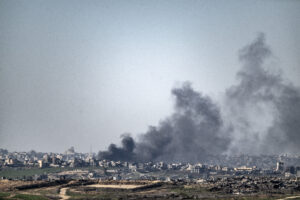Iran retaliates over Nasrallah killing with missile strikes on Israel
Just hours after Israel launched a U.S.-backed military offensive in Lebanon, and less than a week after Israeli forces assassinated Hezbollah leader Hassan Nasrallah, Iran fired approximately 200 ballistic missiles into Israel on Tuesday. This has led to renewed calls for an immediate ceasefire across the region.
Air raid sirens sounded across Israeli cities as missile defense systems illuminated the skies, intercepting many Iranian missiles over Tel Aviv and other areas.
The Iranian Revolutionary Guards Corps (IRGC) claimed responsibility for the missile launches, stating they were in retaliation for Israel’s recent killings of Nasrallah, Hamas leader Ismail Haniyeh, and an Iranian military commander. Last week’s bombing in Lebanon, which killed Nasrallah, also claimed the lives of dozens of civilians. The attack used bunker-buster bombs weighing 2,000 pounds.
U.N. Secretary-General António Guterres condemned the continued violence, saying, “This must stop. We absolutely need a cease-fire.” His remarks came almost a year after Israel’s large-scale offensive on Gaza in response to a Hamas-led attack.
While the Biden administration has suggested it urged Israel to act with “restraint” in Lebanon, U.S. Defense Secretary Lloyd Austin reassured Israeli Defense Minister Yoav Gallant that the U.S. is prepared to defend its personnel and allies from threats posed by Iran and its allied groups.
The National Iranian American Council (NIAC) criticized the U.S., stating that Iran’s missile strikes are a direct result of America’s unwavering military support for Israel, creating “a spiraling conflict” stretching from the Mediterranean to the Arabian Sea. “The Biden administration’s support for Israel’s escalate-to-deescalate policy has massively failed,” said the NIAC, emphasizing that diplomacy is the only viable solution for peace in the region.
Assal Rad, author of State of Resistance: Politics, Culture & Identity in Modern Iran, pointed out a recent comment by U.S. State Department spokesperson Matthew Miller, who had suggested that “military pressure can enable diplomacy” in Lebanon. Rad questioned whether this logic applied equally to Iran.
The IRGC, in its statement, claimed it had exercised “restraint” in July when it chose not to retaliate for the killing of Haniyeh.
Maurice Mitchell, leader of the Working Families Party, urged U.S. President Joe Biden and Secretary of State Antony Blinken to intervene and prevent further bloodshed. “The only pathway to peace is through diplomatic means,” he said.
Meanwhile, U.S. National Security Adviser Jake Sullivan labeled Iran’s missile strike as a “significant escalation” and stressed that the Biden administration would prioritize protecting American interests and promoting regional stability.
Rad pointed out that the U.S. had not used the term “significant escalation” to describe Israel’s actions in Gaza or Lebanon.
With input from Commondreams.org.










